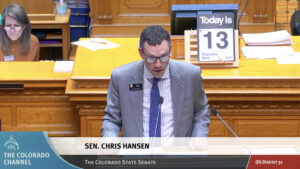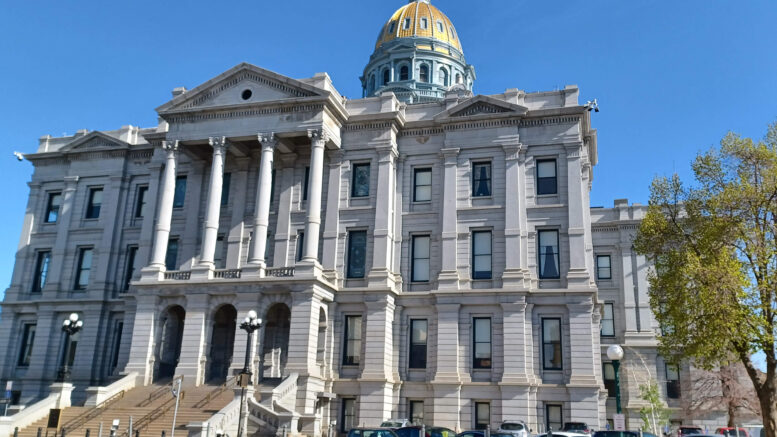With businesses and homeowners facing huge property-value assessment hikes this year, Gov. Jared Polis announced a plan Monday to cap property-tax collections, cut assessment rates and backfill local governments from money that otherwise would go to Taxpayer’s Bill of Rights refunds.
The proposal, expected to be introduced shortly in bill form, provides little to no breaks for second homes and for properties now used as short-term rentals, and it must be approved by voters on the November ballot. With the legislative session required to end by May 8, it immediately faced pushback from Republicans and local-government organizations about its hurried rollout and the near-necessity that debate around the plan will have to be limited if it’s to be passed into law.
But the Democratic governor and legislative leaders within his party, who promised help this session for state residents facing property assessment increases of 33% or more, rolled the plan out Monday with confidence that they can get it passed. Polis said at a news conference that the bill could reduce average residential property-tax spikes by 50%, cutting individuals’ bills by several-hundred dollars in the short term and offering assessment hikes for 10 years that are predictable rather than chaotic.
Details of the plan
“The cost of housing in Colorado is incredibly high, and if we don’t act, Coloradans will suffer record increases on their property taxes,” said Sen. Chris Hansen, a Denver Democrat who will be one of the bill’s sponsors, in a news release. “This proposal will also give voters an opportunity to protect sustainable funding for our schools and local services like hospitals and firefighters while addressing the urgent property tax situation.”

Colorado state Sen. Chris Hansen speaks last month on the Senate floor.
The proposal would extend the residential assessment rate for non-residential property, pegged through a previous bill to drop this year from 29% to 27.85%, through 2026 and then drop it to 27.65% in 2027, 26.9% in 2029 and 25.9% in 2031 if property values hit a growth trigger. That would result in a reduction of non-residential assessments of 10% over eight years following an expected average rise of 18.9% for commercial assessments this year.
Residential assessment rates, meanwhile, would fall to 6.7% through 2032 from rates that are pegged now to be 7.15% between 2025-32, saving the owner of a $600,000 home an average of $1,264 just in the next two years. The bill also proposes reducing the assessed value of each home by $40,000 through 2032 before the assessment rate is applied — a substantial increase from the $15,000 reductions already approved in law for 2023 and 2024.
Caps and backfills
Plus, the proposal would cap the increase in property values from which counties and special districts can reap tax revenues to the annual rate of inflation, allowing only school districts to receive taxes on the full value of the property. However, local governments could override the cap in any year if they hold a public hearing and vote as a body to retain the overage — an allowance that could permit the raising of extra money but subject elected officials to voter consequences if there is blowback.
The state government would backfill local governments for their lost property-tax revenue by raising the TABOR revenue cap by 1% if voters approve the question on the November ballot. It would divvy out that money, expected to be $167 million in 2024, according to a formula that pays the highest amount by percentages to slow-growth areas that otherwise could lose funding critical to providing services.
Under the plan, the one group of property owners that will not benefit substantially are owners of second homes and investment properties, who will see their assessment rates drop as planned for the next two years but decline only from 7.15% to 7.1% from 2025-32. That provision comes as more mountain towns increase regulations on short-term rentals that they believe are eroding the base of long-term rental housing needed for their workforce — efforts that anger proponents of the theory that property investment builds family wealth.
A clash of property-tax ballot initiatives?
Monday’s announcement seemed designed to head off two proposed ballot initiatives that sought to take the issue of rising property assessments and turn them over to the people in lieu of a legislative solution. One of the groups proposing such a measure — the liberal Bell Policy Center — called Polis’ proposal “a balanced approach” and said it will actively campaign for it and move forward its own effort only if a competing measure from conservative Advance Colorado were to advance to the ballot.
However, the Democratic plan did nothing to salve Advance Colorado President Michael Fields, who criticized the plan for redirecting TABOR refund money to fund the plan and creating a “fake cap” for property-tax increases that can be wiped out easily by local governments. His group’s proposal would cap tax increases based on property valuation at 3% per year unless a property is substantially improved, and it would set aside $100 million a year for the state to backfill fire-protection districts but not other local governments.
Other groups complained that the last-minute introduction of the bill leaves them unable to take a stance on it right away. Ann Terry, executive director of the Special District Association of Colorado, said her group was not privy to drafts of the legislation despite the massive impacts it could have for districts across the state.
A chaotic final week
“We are disappointed in how the process has played out and now find ourselves pressed against a wall to develop a position and determine how we can best contribute to the conversation under the Dome,” Terry said.
The bill, when introduced, will compete for time and attention in the final week of the session with a host of other wide-ranging bills with significant implications for the future of the state that have both supporters and detractors lining up. Those include a bill that would lay the groundwork for an overhaul of the state’s air-quality permitting system, a proposal to give local governments first right of refusal on apartment complexes that go up for sale and a land-use reform bill at the center of Polis’ housing-affordability push that was gutted in the Senate but may see many of its most controversial aspects reinserted in the House, according to Colorado Public Radio.
